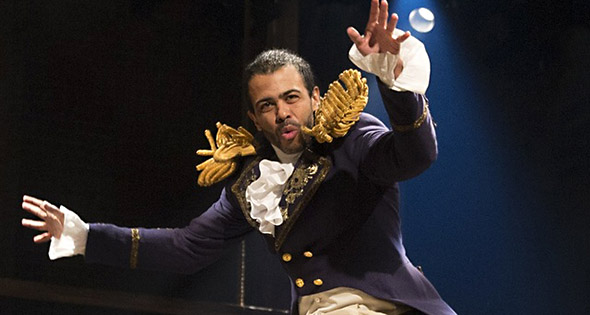ELECTION INSIGHTS 2018
Music for the Midterms
A Playlist from the MIT Music Community

Daveed Diggs as Marquis de Lafayette, "Hamilton"
As America heads toward the midterm elections, MIT's music community presents a playlist—Music for the Midterms—along with commentaries on why each work resonates with this election season. Have a listen!
ELECTION INSIGHTS 2018
Research-based perspectives from MIT
Firefox users:access the playlist via this link to YouTube.
Playlist: Music for the Midterms
Listen to the entire collection on our YouTube channel — or just to individual works, listed below. Scroll down for great notes!
Beethoven: Concerto No. 4 in G Major
Brandi Carlile: The Mother
Aaron Copland: Lincoln Portrait
Childish Gambino: This Is America
Mark Harvey: No Walls
Marian McPartland: Things Ain't What They Used to Be
Lin-Manuel Miranda, Hamilton: My Shot
Janelle Monáe: Mr. President
Benjamin Park: For Purple Mountains
Elena Ruehr: Shimmer
Joseph Schwantner: New Morning for the World
Verdi: Inquisitor's Scene, Don Carlos
John Williams: Arlington
George and Ira Gershwin: Works from the musical, Of Thee I Sing
Wintergreen for President
Love Is Sweeping the Country
Of Thee I Sing
Act I, Finale
Finale
Notes on the Playlist Selections

Teresa Neff on Beethoven
Lecturer, History/Culture
Beethoven: Concerto No.4 in G Major
For me, Beethoven’s Concerto No. 4 in G major offers a respite from the clamor of the election season. The opening bars are simple and extraordinary; the whole is a world unto itself, with struggles, triumphs, and humor. Some may call it “heroic,” but I hear it as quintessentially human.
On Brandi Carlile
Brandi Carlile: The Mother
In this work, Carlile offers a portrait of a contemporary American family — her own — following the birth of her first child. In a classic Americana style, Carlile places her family — her child, her wife, and herself — in a variety of American landscapes, from New York City to snowbound mountains, as well as within the American political landscape in which her daughter will grow up. This family carries their nation's politics with them as Carlile shows, and must blend the private life with the inevitably political experience of being a queer parent in America.
Peter Child on Copland and Schwantner
Class of 1949 Professor of Music, Margaret MacVicar Faculty Fellow
Aaron Copland: Lincoln Portrait is an old favorite is for orchestra or wind ensemble and narrator, based upon texts selected from speeches by Abraham Lincoln. President L. Rafael Reif performed this piece alongside the MIT Wind Ensemble. You can find a copy of the source texts here.
Joseph Schwantner: New Morning for the World is another, more contemporary piece also for narrator and orchestra, based upon selections from speeches by Martin Luther King. This piece has been recorded commercially, and there are several recordings online as well.
Both pieces express the noblest aspirations for our democracy.
Patricia Tang on Childish Gambino
Associate Professor of Music
Childish Gambino: This Is America
This song speaks for itself, and speaks to the heart of what so many Americans are feeling in this current political climate. Read a breakdown of the video at The Washington Post.
Mark Harvey On "No Walls"
Senior Lecturer in Music
Mark Sumner Harvey: No Walls
This composition is recommended as a positive statement of our shared humanity, an anthem of hope and inclusivity. Written originally for a benefit concert for Doctors Without Borders, the piece is inspired by Duke Ellington’s credo to move “beyond category” in music and life. This composition was performed on MIT’s “Uniting Through Voice and Song” in the wake of the 2016 election and has been performed several times in the Boston City Council Chamber for International Jazz Day, April 30.
On Marian McPartland
Marian McPartland: Things Ain't What They Used to Be
A pioneer woman in jazz, McPartland was an English-American pianist, composer, the longtime host of an NPR radio show on jazz, and an advocate for other women in jazz. Her style has been called “flexible, complex, and almost impossible to pigeonhole.” Named an American Jazz Master by the NEH, she also received a Grammy Award for lifetime achievement, and was inducted into the Order of the British Empire. "Things Ain't What They Used to Be" is a 1942 jazz standard with music by Mercer Ellington, the son of Duke Ellington. The rarely-sung lyrics by Teddy Persons (the pen name of Simon Schwartz) are in the voice of a weary person, but one who can see a glow on the far horizon, and "a happy story yet to come."
Emily Richmond Pollock on Lin-Manuel Miranda
Associate Professor of Music
Lin-Manuel Miranda, Hamilton: My Shot
I recommend Lin-Manuel Miranda’s “My Shot” from the cast recording of Hamilton. Sung by the title character (Alexander Hamilton, portrayed by Miranda) alongside his cohort of likeminded revolutionaries, this well-known song from the hit 2015 musical Hamilton celebrates individual political agency. “My Shot” alternates intricate, individualized verses with exuberant choruses to convey the electric feeling of being inspired to organize a revolutionary movement with one’s friends. Don’t throw yours away.
On Janelle Monáe
Janelle Monáe: Mr. President
Monáe's typically nuanced music has crisply straightforward lyrics in this case. "Can we talk about the education of our children? / A book is worth more than a bomb any day/ [...] Please Mr. President / Where's all the money you spent?"
While "Mr. President" isn't technically part of Suite I of Monáe's ongoing Metropolis Suites project, the song appears on her 2008 album alongside Suite I. The Metropolis Suites has its roots in the the Fritz Lang mainstay of science fiction, the 1927 silent film Metropolis. The film warns against the dehumanization of workers in rampant capitalism; Monáe's Metropolis narrative, with perspectives of Afrofuturism, centers on a woman android whose body is a commodity. Alongside Monáe's appeal for humanity above profit, the contemporary interrogation of "Mr. President" is a portrait of competiting priorities facing the modern nation.
Benjamin Park on For Purple Mountains
Lecturer, Composition/Theory
Benjamin Park: For Purple Mountains
I wrote For Purple Mountains in the aftermath of the 2016 election, originally for the Flatirons Chamber Music Festival in Boulder, CO. While referencing the “purple mountain majesties” from Katharine Lee Bates’s poem “America the Beautiful” (and Samuel A. Ward’s setting of the text), the title and music are also deeply concerned with the country’s stark political divide (which sadly, has seemed only to deepen). In this sense, the “purple mountains” are a mix between blue and red that is easier to see than to traverse.
While much of the music is reflective, including a mensuration canon symbolizing how "political debates" in this country all too often consist of two sides talking past each other, the piece ultimately strives to be celebratory, not of the situation we find ourselves in, but rather of the principles described in “America the Beautiful.” There is a lesser known stanza from the original poem that I find particularly poignant as we approach the 2018 midterms:
O beautiful for pilgrim feet / Whose stern, impassioned stress / A thoroughfare for freedom beat / Across the wilderness! / America! America! / God mend thine every flaw / Confirm thy soul in self-control / Thy liberty in law!
On Elena Ruehr
Elena Ruehr: Shimmer
An award-winning faculty member at MIT, Elena Ruehr has also been a fellow at Harvard's Radcliffe Institute and composer-in-residence with the Boston Modern Orchestra Project. Ruehr’s inspiring work — which includes compositions for chamber ensemble, orchestra, chorus, opera, dance, and silent film — has been described as "sumptuously scored and full of soaring melodies," “masterfully crafted,” and full of “heart and a forceful sense of character.” The lyricism, resilience, and energy of Ruehr’s music are ever welcome, and never more than during a momentous election season. "Shimmer" is performed by the Metamorphosen Chamber Ensemble.
Charles Shadle on Verdi's Don Carlos
Senior Lecturer, Composition and Theory
Verdi: The Grand Inquisitor scene, Don Carlos
In this season of midterm election jitters I would suggest that everyone listen to the scene between Philip II (Bass) and The Grand Inquisitor (Bass) in Verdi’s magisterial, if textually problematic opera, “Don Carlo(s).” Much about the opera, from the language in which it should be sung to even the number of acts, is ambiguous.
Verdi’s Philip II certainly isn’t the beleaguered CEO of an ungainly multinational that modern scholars posit, but rather a conflicted and jealous man with at least a vestigial ethical sensibility, who seeks out the devil — or at least that Deep Church equivalent — the nameless and sightless Grand Inquisitor. Accompanied by some of the most frightening music ever composed, the Inquisitor offers succor, but at a terrible cost. The scene ends with the king trying to shut the lid of the Pandora’s Box he has opened. “You must forget what we have spoken about,” he sings. “Perhaps,” is the reply.
It seems to me that Verdi is the most insightful and politically engaged of composers. Surely in this awful scene he has shown the horrors of an unchecked union of church and state. Though Verdi’s characters may lack the perspective to realize it, such a union diminishes all the participants. While our current president isn’t an absolute monarch like Philip II, when we enter the voting booth, let us recall how central the separation of church and state is to American democracy. Darkness, and the contrabassoon, must not be allowed to prevail.
Martin Marks on Gershwin and Williams
Senior Lecturer, Theory/Culture
George and Ira Gershwin: Of Thee I Sing
On the lighter but brilliant Broadway side, I recommend the musical Of Thee I Sing: score by George Gershwin, lyrics by Ira Gershwin and a book by George S. Kaufman and Morrie Ryskind. As Wikipedia says, "The musical lampoons American politics." The entire score is a delight, but here are some highlights with especially political resonance. These tracks are on Youtube, taken from the outstanding studio recording made in 1987, conducted by Michael Tilson Thomas.
Wintergreen for President, the opening number, is a minor-key march that satisfies mindless political campaign sloganeering.
Love Is Sweeping the Country comes in as a wonderfully peppy dance song, which represents the political platform of John P. Wintergreen and his soon-to-be bride, Mary. Love is the platform. But the lyrics are quite satirically rich, especially in the verses.
Of Thee I Sing is the title love ballad. Nothing sums up the highbrow/lowbrow mixture of idioms in Broadway lyrics quite so well as the song’s opening line, “Of thee I sing—Baby!”
Act I Finale The opening of the finale, which is to be the inaugural ceremony of the president-elect and simultaneous wedding of John and Mary, is particularly timely — a satirical march, sung by nine robed soloists:
“WE’RE THE One Two Three Four Five Six Seven Eight NINE SUPREME COURT Judges. …
We have powers that are positively regal /
Only we can take the law and make it legal. /
We’re the “AKs” who give the OKs” etc.
(“AK” is shorthand for alte kocker, Yiddish slang for “Old timer.”)
The rest of the finale, which is all on the YouTube site, is marvelously funny and beguiling music. Satirical, yes, but also eminently musical and polished!
John Williams: Arlington
Arlington On the suspenseful and cinematic side, I would point listeners to a masterful score by John Williams: The mournful music that concludes the film JFK. He called this track Arlington in honor of the cemetery where the president is buried. It’s a gorgeous Mahlerian lament.
Suggested Links
ELECTION INSIGHTS 2018
Complete Series, Perspectives from MIT
MIT Music
Musical Institute of Technology
A book about music and the MIT mission | photographs by Jon Sachs
How to Vote in Every State.
See video with info for your state — and vote!
